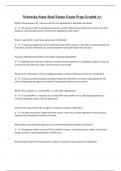Nebraska State Real Estate Exam Prep Graded A+
What is the purpose of an "exclusive right to sell" agreement in Nebraska real estate?
✔️✔️An exclusive right to sell agreement grants a broker the exclusive authority to market and sell a
property, ensuring they receive a commission regardless of who sells it.
What is required for a valid lease agreement in Nebraska?
✔️✔️A valid lease agreement must include the names of the parties, a description of the property, the
lease term, and the rental amount, and it should be in writing if longer than one year.
How does Nebraska law handle tenant rights regarding habitability?
✔️✔️Nebraska law requires landlords to maintain rental properties in a habitable condition, ensuring
essential services like heat, water, and electricity are provided.
What are the implications of not providing a property condition disclosure statement in Nebraska?
✔️✔️Failing to provide a property condition disclosure statement can result in legal liability for the
seller and potential damages for the buyer if undisclosed defects are discovered.
What is the purpose of a "counteroffer" in real estate negotiations?
✔️✔️A counteroffer is a response to an initial offer that modifies terms, allowing negotiations to
continue until both parties reach an agreement.
What are the requirements for an agent to represent a buyer in Nebraska?
✔️✔️An agent must have a valid real estate license, enter into a written agreement with the buyer,
and disclose any potential conflicts of interest.
What actions may lead to disciplinary action by the Nebraska Real Estate Commission?
✔️✔️Disciplinary actions may result from unethical conduct, misrepresentation, failure to maintain
proper records, or practicing without a valid license.
What should a buyer do if they discover a defect in a property after purchase in Nebraska?
,✔️✔️The buyer should review the purchase agreement, determine if the defect was disclosed, and
consult legal counsel regarding potential remedies or actions.
How is the concept of "joint tenancy" defined in Nebraska real estate law?
✔️✔️Joint tenancy is a form of property ownership where two or more individuals hold equal shares,
with the right of survivorship, meaning the surviving owner(s) inherit the deceased owner's share.
What must landlords do if they wish to increase rent in Nebraska?
✔️✔️Landlords must provide tenants with written notice of the rent increase, typically 30 days in
advance, unless otherwise specified in the lease agreement.
How is property tax assessed in Nebraska?
✔️✔️Property tax in Nebraska is assessed based on the property's value as determined by the county
assessor, and taxes are levied annually.
What is the role of a "real estate attorney" in Nebraska transactions?
✔️✔️A real estate attorney assists clients with legal aspects of property transactions, including
reviewing contracts, providing advice on legal obligations, and ensuring compliance with state laws.
What recourse does a tenant have for a landlord's failure to make necessary repairs?
✔️✔️A tenant can request repairs in writing, and if the landlord fails to act, the tenant may have the
right to withhold rent, make the repairs themselves, or seek legal remedies.
What are "zoning laws," and how do they affect real estate in Nebraska?
✔️✔️Zoning laws regulate land use and development, affecting what types of properties can be built
and how they can be used in specific areas.
Carbon Monoxide Safety Act
1) Who Complies: Seller of SF Dwelling, Seller of MF Dwelling, Owner of SF Rental, Owner of MF Rental
2) An operational CO detector must be installed on each habitable floor of the dwelling, or as specified
in the jurisdiction's building code
, Type of CO Detector
1) The detector may be A) battery powered, B) Plug into a wall outlet, C) Wired into the dwelling's
electrical system (must have battery back up), D) Connected to an electrical system via an electrical
outlet
2) The detector may be a combo CO/Smoke Alarm
3) The detector must be installed and working properly prior to transfer of Title or tenant occupancy
4) It is unlawful for anyone to remove the batteries, or otherwise make the detector inoperable
Seller Property Condition Disclosure Act
The law applies to all one to four unit residential property, which includes: 1) the sale of a residence
which is subject to a ground lease coupled with improvements, and 2) a lease with option to purchase
residential one to four unit dwelling; the seller of residential property must provide a written property
condition disclosure statement, signed by the seller, to the purchaser/purchaser's agent on or before
the effective date of any purchase agreement
Types of Conveyances where a Seller Property Condition Disclosure is not required:
1) Resulting from a court order
2) Foreclosure or by trustee under power of sale of a deed of trust
3) Bankruptcy
4) Deed in lieu of foreclosure
5) By a fiduciary in administering an estate, guardianship or conservatorship, unless the fiduciary
inhabited the property
6) Co-owner(s) conveying to another co-owner(s)
7) To a spouse of blood relative
8) Divorce or legal separation
9) A corporate merger
10) Conveyance to or from a gov't entity
11) New construction that has never been occupied
12) From a third party relocation company if the disclosure statement from the most recent seller is
provided
Agent Responsibilities regarding the Seller Property Condition Disclosure statement:
1) Licensees acting as seller's agents must deliver the statement to the buyer or the buyer's agent on or
before the effective date of a binding purchase agreement
2) Licensees acting as buyer's agents must deliver the statement to the buyer on or before the effective
date of a binding purchase agreement
3) Licensees are not required to verify the accuracy or completeness of any disclosure statement that
does not limit the licensee's obligations to customers and clients as spelled out in the Agency
Relationships Law




